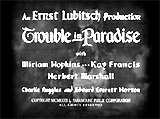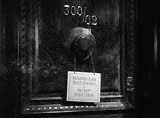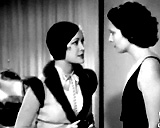
|
Trouble in Paradise
(1932)
In the exquisitely-directed Ernst Lubitsch production
- a sophisticated, pre-Code romantic comedy about a pair of sophisticated
Parisian thieves: European gentleman crook and con-artist Gaston
Monescu (Herbert Marshall) and his female soul-mate accomplice-pickpocket
Lily Vautier (Miriam Hopkins) who engaged in sex without marriage,
and crime without consequences:
- in the opening scene set in Venice, the pair shared
a romantic and erotic dinner, in which sexual conquest and success
in robbery were equated - the pair's polite and quick-witted, but
seductive game/duel of dinner-table pickpocketing and mutual theft
stretched on further, as they declared their love for each other
while returning precious purloined objects
- their obviously-unmarried association was fueled by
illicitly-acquired possessions that served as an aphrodisiac during
foreplay; the erotic attraction between the two criminal soul-mates
heated up considerably - and led them to recline on the couch where
he professed his love: "I love you. I loved you the moment I
saw you. I'm mad about you - my little shoplifter. My sweet little
pickpocket, my darling"
- the scene ended when the couple's images slowly dissolved,
and magically vanished and disappeared, leaving an empty sofa in
the twilight - the room's light was switched off, and a sign was
hung on the door: "Do Not Disturb"
- later, the film's memorable quote from astonished
theft victim and rival suitor François Filiba (Edward Everett
Horton) - an associative memory that enlightened Filiba to realize
the truth about Gaston (who was using the alias name of Monsieur
La Valle, and was employed as Mme. Mariette Colet's (Kay Francis)
personal secretary, in order to rob her); Filiba made the
cryptic comment to Mme. Colet: "Tonsils! Positively tonsils!",
inferring that Gaston had robbed him in Venice when posing as a doctor
- after many romantic entanglements, the concluding
scene of Gaston delivering a genuinely-honest confession to his widowed,
wealthy employer (the heiress-owner of a perfume company) that he
had fallen in love with his newest target of thievery; she was completely
dismayed and heartbroken: "You wanted a hundred thousand francs,
and I thought you wanted me"; he sheepishly confessed: "I
came here to rob you, but unfortunately I fell in love with you,
Mariette"; when she asked: "Why did you take the money?" he
didn't answer as a bell tower chimed in the distance, and she retreated
to her bedroom; Lily suddenly appeared and interjected that she was
the actual robber (revealing the wad of stolen banknotes in her purse):
"Madame, the only thing that seems to stand between you and romance
is a hundred thousand francs. Well, he didn't take it. I took it -
all by myself. Now you can have your romance"; then she offered
some realistic advice: "When you embrace him, be sure to put on
gloves. It would be too bad if your fingerprints were found..."
- in the epilogue, after both Gaston and Lily had admitted
their guilt to Mme. Colet, Gaston pursued after the departing Lily,
realizing that he was only truly in love with her; Mme. Colet willingly
let him leave her as a romantic partner and surrendered her pearl
necklace as a gift to Lily; the high class, amoral thieves Gaston
and Lily escaped in the back of a taxi-cab, happily reunited and
in possession of the pearl necklace, Mariette's purloined 125,000
franc handbag, and the wad of 100,000 franc banknotes
|








|









